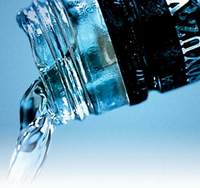Russians prefer vodka to all foreign-made alcohol beverages
Finland is putting pressure on other EU member states in an attempt to push through new legislation which would impose a narrow vodka definition on the centuries-old spirit marketed within the European Union. After taking over EU presidency in July, Finland looks set to straighten out the “vodka issue.” Today almost all colorless strong alcoholic beverages in Europe carry the vodka label – the Finns regard the situation as something akin to an insult to their national pride. In the meantime, the Russians seem to stay out of the debate despite considering vodka their national drink from time immemorial.

The law passed by the EU in 1989 states that vodka is a spirit drink made from ethyl alcohol of agricultural origin. Now Finland is aligned with Poland, Sweden and other traditional vodka producers around the Baltic Sea. They want the EU to insist that vodka should be made only from distilled grain and potato.
Finland will chair the EU till the end of this year. The Finns intend to amend the current EU legislation in order to split the spirits into two groups. The first group would comprise “original” varieties of vodka made with traditional ingredients e.g. potato and wheat. The other group would be for spirits made from other raw materials of agricultural origin.
Two terms – Spirit Drink or White Spirit Drink – have been coined for designating the spirits of the latter group. According to Finland’s Agriculture Minister Juha Korkeaoja, the new policy should give a boost to vodka’s reputation and enhance popularization of the drink.
“The Scottish whisky has a clear-cut definition – it’s a strong alcoholic drink made from distilled malted grain, especially barley or rye,” says Alexander Schtubb, a Finnish member of the European Parliament, in an interview to Trud. “We demand that vodka be treated equally. There are centuries of tradition behind this drink. We just shouldn’t turn vodka into a second-rate alcoholic beverage. We might as well advise the Scotts: from now you’re free to use any ingredients for making whisky,” adds Schtubb.
The above opinion fell short of the intended effect, if any. It is Scotland that strongly objected to Finland’s move to restrict vodka ingredients. Despite being the world’s major whisky producer, Scotland also manufactures several brands of vodka. Alan Wilson, Scotland’s Deputy Minister for Enterprise and Lifelong Learning criticized the EU vodka-labeling plans by saying that there is a difference between two drinks – whisky is supposed to have the flavor of a chief ingredient it is made from while vodka should not have any raw material aftertaste.
Predictably enough, the Finnish lawmakers were infuriated by the Scottish remarks. Helsinki accused Edinburgh of “cultural aggression” aimed atpurportingwhiskysuperior to vodka in terms of quality. In the meantime, quite a few EU countries share Scotland’s stance on the issue. Should the proposed regulation be enacted, the majority of strong alcoholic “white” spirit drinks made from cheap spirits will be banned from carrying the vodka label, and may simply disappear from the liquor stores, says an article published by The Times. The cheap spirits are used for vodka manufacture in France, Italy, Czech Republic and Hungary.
Alan Butler, external affairs director for Diageo PLC, London-based multinational drinks producer, says the proposed regulation would hit vodka martini at the most. Vodka martini is made with spirit distilled from French grapes. The drink is quite popular among young professionals in the City. “I just can’t imagine a 25-year-old Briton, an investment banker or broker, who would call on the pub and ask a barman to pour him a glass of ‘white spirit with martini’,” says Butler with a wry grin.
Russia does not seem to care a bit about the ongoing Europe-wide “vodka war.” If you ask a regular toiler in Voronezh, Magadan, or other provincial Russian city about the quality of the Scottish whisky or German schnapps, you are most likely to hear “that foreign liquor is no vodka, it’s just crap booze.” Indeed, the traditional Russian vodka is made with the so-called “live water” i.e. water is never distilled for the purpose of making vodka. This special ingredient enabled the Russian vodka to become the world’s only quality spirit drink of 40% alcohol by volume (80 U.S. Proof).
Pavel Shapkin, Chairman of Russia’s National Alcoholic Association, comments on the article:
“Vodka is a universal product. The seemingly easy methods of its manufacture contributed to the spread of the “white drink” all over the world. However, the Western specialists have long agreed to our point of view: the genuine Russian vodka should be made in Russia. In fact, there’s nothing to argue about. Apart from the well-known schnapps, dozens of strong alcoholic drinks are made in Germany alone. Most of them are marketed by the Russian names: Nicholas, Alexander I, Prince Igor, Tolstoy, Pushkin, etc. Just a handful of those drinks are of acceptable quality. Anyway, they don’t use the ‘live water’ in the manufacture. In other words, those liquors are not genuine vodka. By the way, the Finns make pretty good vodka using the old Russian recipes. Meanwhile, many Western vodka producers simply masquerade their drinks as the real thing and thus undermine the global market of quality vodkas. However, Russia has already exported more than 50 million liters of vodka since January.”
Trud
Translated by Guerman Grachev
Pravda.ru
Join free discussions on Pravda.ru English forum. Registration is free!
Subscribe to Pravda.Ru Telegram channel, Facebook, RSS!




